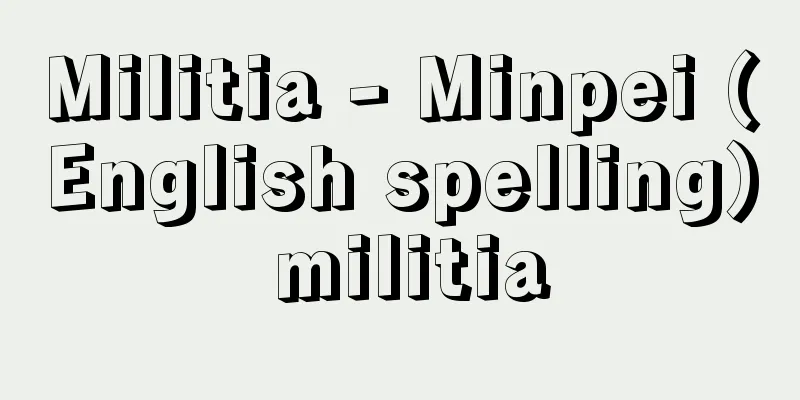Militia - Minpei (English spelling) militia

|
While standing armies generally reside in barracks full time and devote a certain number of years to military training, a militia is a military organization of citizens that receives short-term training on a regular basis, but maintains jobs at home in peacetime and is mobilized in emergencies and is primarily responsible for local defense. The origin of the militia goes back to ancient Greece and Rome, when free citizens were obligated to serve in the military. This militia system was eventually replaced by mercenaries and standing armies, and militias almost disappeared in the Middle Ages. In modern Europe, Britain maintained the tradition of citizen militias for a long time, and France also adopted the militia system during the revolutionary period, but in the 19th century it was gradually replaced by compulsory military service or only played a reserve role for the regular army. The same is true in the United States, which placed importance on militias. In the Soviet Union after the revolution, there was a fierce debate about whether militias, as people's armies, should be the basis of the military, but the faction of regular armies ultimately won (in the former Soviet Union, the name "militia (militia)" was the name of the civil police). On the other hand, countries such as Israel, China, and Cuba still have militias as auxiliary military forces, and Switzerland, a permanently neutral country, does not have a standing army and leaves the defense of the country to militia-like organizations. The militia system places a light burden on national finances and cannot be underestimated as a national organization, but it cannot quickly adapt to advances in military technology in terms of training and is not suitable for offensive mobile warfare. In addition, because it is in constant contact with civilian life, unless there is a strong national consensus, there is a strong possibility that political discord and conflict will be brought into the military organization, and while rulers and regular armies may temporarily adopt the militia system in serious situations, they have generally opposed making it permanent. [Kaoru Yamazaki] Source: Shogakukan Encyclopedia Nipponica About Encyclopedia Nipponica Information | Legend |
|
常備軍が一般に常時兵営に起居して、一定年数にわたって軍事訓練に専念するのに対し、定期的に短期間の訓練は受けはするが、平時には家にあって職につき、緊急時には動員されて、主として地域防衛の任にあたる市民の軍事組織を民兵とよぶ。 民兵の起源は、自由民が軍務に服する義務をもっていた古代のギリシア・ローマにまでさかのぼれる。この民兵制はやがて傭兵(ようへい)や常備軍によって代替され、中世には民兵はほとんど消滅した。近代ヨーロッパでは、イギリスが長く市民軍の伝統を守り、フランスも革命期に民兵制度を採用したが、19世紀に入るとしだいに義務兵役制にとってかわられるか、正規軍の予備的な役割を果たすだけになる。民兵を重視したアメリカも同様である。革命後のソ連では、人民の軍隊としての民兵が軍隊の基本となるべきか否かについて激しい論争があったが、正規軍派が最終的に勝利した(旧ソ連で「民兵(ミリツイア)」の名でよばれたのは民警である)。一方、イスラエル、中国、キューバなどの国々は、いまでも民兵を補助的な軍隊としてもっており、また、永世中立国スイスは常備軍をもたず、国土防衛を民兵的組織にゆだねている。 民兵制度は国家財政への負担が軽く、国民的な組織としてけっして軽視はできないが、軍事技術の進歩に訓練面で迅速に適応できず、攻勢型の機動戦にも向かない。また、市民生活とつねに接触しているため、よほど国論が一致していない限り、政治的な不和や対立を軍事組織内に持ち込む可能性が強くあり、為政者や正規軍は深刻な事態に一時的に民兵制を採用することがあっても、その恒久化にはだいたいにおいて反対してきた。 [山崎 馨] 出典 小学館 日本大百科全書(ニッポニカ)日本大百科全書(ニッポニカ)について 情報 | 凡例 |
>>: Ministry of Civil Affairs note
Recommend
ruq'a (English spelling) ruqa
...The Sursi typeface is a monumental typeface th...
Ilya, A.
… [Military rule to civilian rule] However, the i...
Brooch - brooch (English spelling)
A pin-type accessory for clothing. Originally a p...
Bruegel, Ambrosius
…Flemish painter. Commonly known as Bruegel the E...
Litigation records - Sosho Kiroku
A bound collection of documents submitted to the ...
Xu Ling (English spelling)
[Live] Tiankan 6 (507) [Death] Shitoku 1 (583) A C...
Liver Microsomes
…P450 is also known as a drug-metabolizing enzyme...
Tarot (English)
Also called Tarot. A special deck of cards that is...
Quadi tribe
…In Britain, Scotland was abandoned, and Hadrian&...
Battle of Gaugamela - Battle of Gaugamela
The Battle of Arbela was fought in Gaugamela, near...
Swadeshi (English spelling)
Originally an adjective meaning "of one'...
Ikko Sanzonbutsu - Ikko Sanzonbutsu
...The head priest is the head priest of the Taka...
Wareru Dhammathat
The Dhammatha is a code of law of Myanmar (Myanmar...
Naruto Strait
A strait between Shikoku and Awaji Island. It is ...
Ohatsuo - Good morning
...This is an event held at the first fishing exp...









